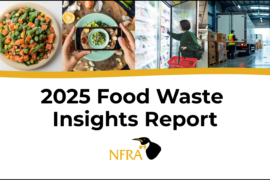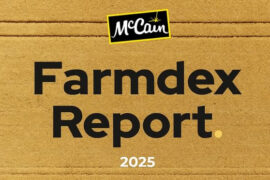As of April 8, the novel coronavirus pandemic that originated in Wuhan, China late last year had been attributed to over 82,000 deaths worldwide, of which more than 13,000 have been recorded in the United States and almost 5,500 in New York alone. The second update on Covid-19 from Technomic’s Foodservice Impact Monitor explores the continued effect of the deadly pathogen on the industry in the United States, including economic projections, restaurant adaptations for dine-in alternatives, increased strain on particular segments and efforts being put toward policy changes and government support.

Joseph Pawlak, managing principal at the Chicago-headquartered Technomic, a global foodservice research and market forecasting company, outlines major points of the report below.
Economic projections disagree on long-term outlook, but agree that in the short term shows a cratering in GDP. There is wide disagreement about whether Covid-19 will be an economic shock with a sharp recovery or if it will pull the economy into a sluggish recession. The previous worst quarter in US history for gross domestic product was Q2 2009, immediately after the economic crash. That quarter, the GDP dove by 3.9%, a fraction of the projections we are seeing as a result of Covid-19. The economic shock from this event is unprecedented.
Consumer spending on foodservice continues to drop. For the average consumer, Technomic research suggests that spending has declined by an estimated 45% from a typical week in February, with further planned reductions expected to come. Consumer demand is still present in the marketplace, but as the pandemic has heightened and concerns have grown, a new normal is setting in. Shelter-in-place and social distancing actions have resulted in fewer occasion-oriented opportunities for foodservice usage. Office closures enforcing more telecommuting means fewer off-premise lunch occasions, especially in urban and suburban locations. This is having an impact on quick service restaurants (QSRs) and fast-casual business in particular.
Business Survival at Stake
While operators are most likely to feel the virus is most negatively impacting the US economy, sales and profits, a staggering 70% of operators are concerned that Covid-19 will have a negative impact on their ability to even remain in business.
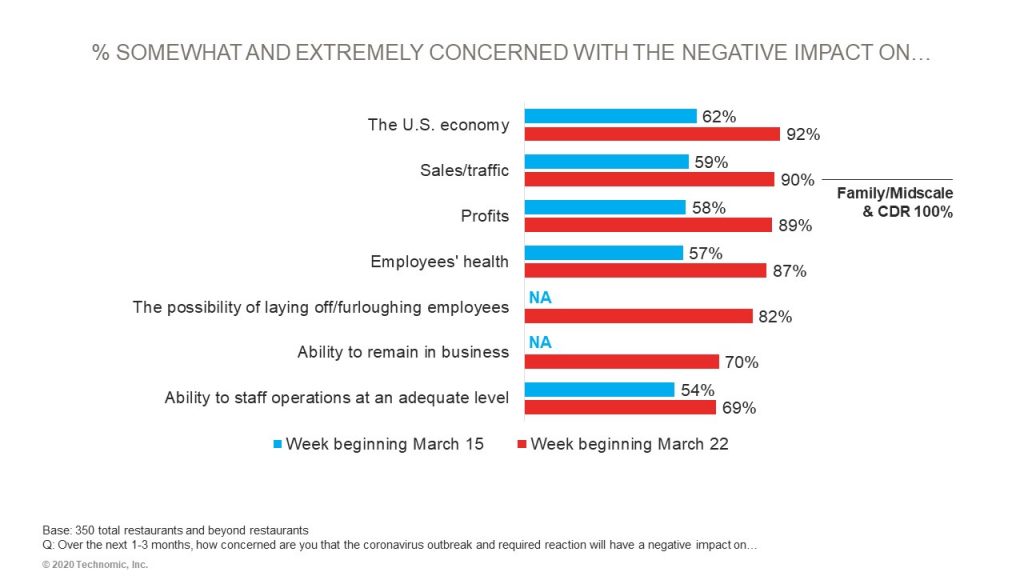
Stay-at-Home Orders
Stay-at-home and shelter-in-place orders force the closure of all nonessential businesses (the definition of which varies from state to state). Residents are generally still permitted to go outside for exercise, to the grocery store or to the doctor, but these orders represent a significant shutdown of state economies and stricter enforcement of social distancing. Along with these orders, most states are prohibiting dine-in services or placing strict capacity limits, allowing only for pickup, drive-thru and delivery services.
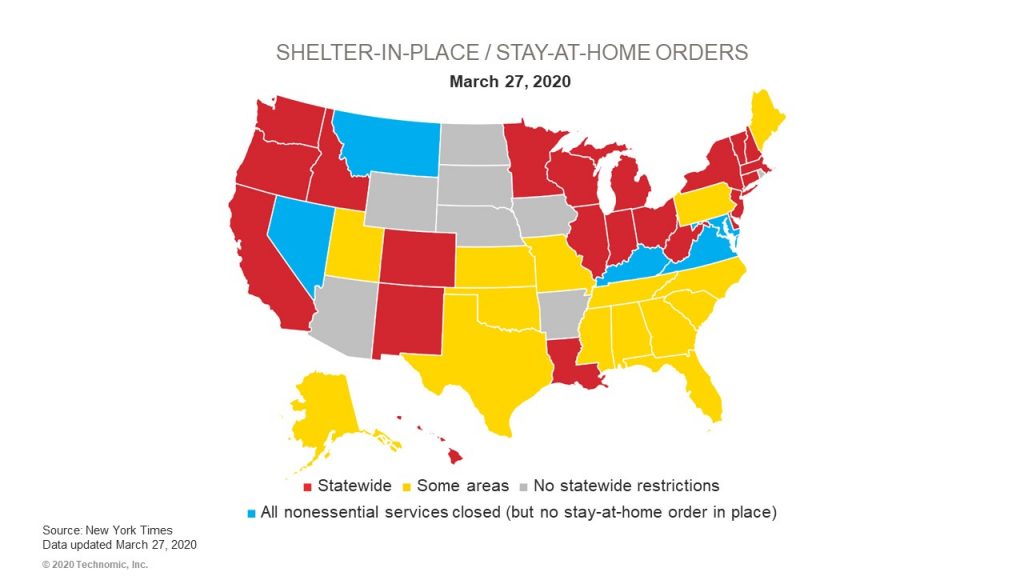
Although many restaurants were participating in delivery and takeout prior to the outbreak, operators have adjusted their offerings and added promotions to encourage dine-in alternatives. Promotions include free or discounted delivery, curbside pickup, digital payment options, daily deals or specials and adult beverage options. Some are scaling back menu offerings or promoting family meals to improve operational efficiencies. Many have partnered with third-party delivery apps to increase their visibility and delivery radius.
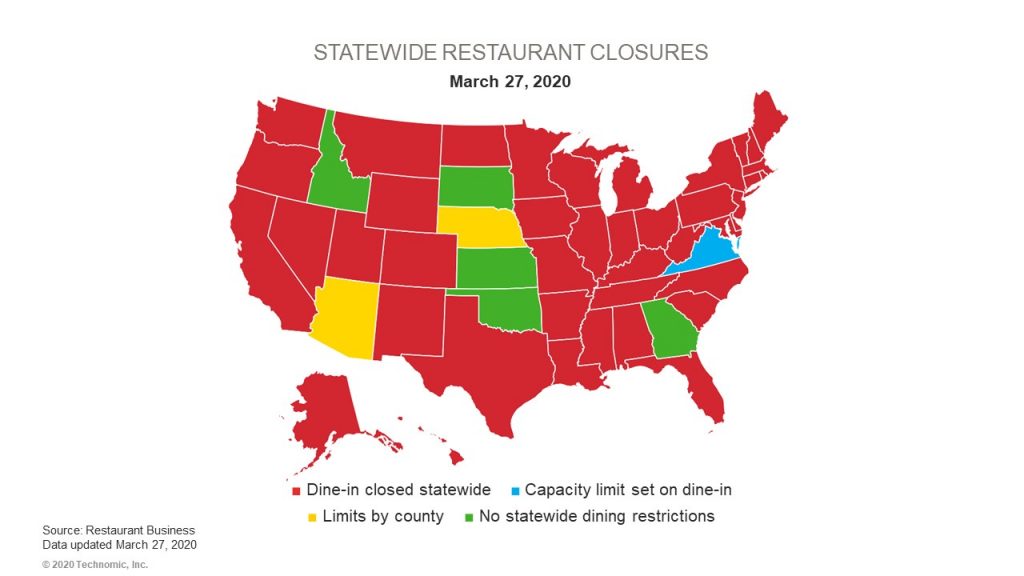
Operational Changes Critical to Covid-19 Response
Among half of operators, the closure of dine-in service has also led to a reduction in staff and operating hours. A renewed attention to sanitation practices has also been at the forefront of operation reaction to the virus – 51% have retrained staff on food safety and cleaning practices, 44% have introduced new food safety measures and 40% have started cleaning kiosks more often.
Operator Relief Efforts
In terms of operator relief efforts, Technomic is seeing:
- Royalty relief with franchisors extending deadlines
- Rent deferments
- Crowdfunding to assist struggling restaurants
- Government relaxation of alcohol delivery restrictions
- Waiving of delivery subscription fees
- Delays for remodeling and other reinvestments
- Shifting menus to focus on the most important and operationally effective menu items
- Chains tapping into credit
As part of the federal stimulus package, restaurants with more than one location and fewer than 500 employees can borrow up to 2.5 times their monthly payroll or $10 million, whichever is lower. Chain affiliations are not a factor in determining eligibility, which is a major win for franchisees.
On March 20, Technomic reported that the expected foodservice impact ranges from a decline of 11% to 27% in year-over-year growth for 2020. But while most of the changes seem grim, there are also signs of hope, specifically from the operators who are adapting their service model in response to the new environment.
Closed Schools Threaten $22.8 Billion K-12 Foodservice Industry
All states have closed at least some school districts, with more instituting statewide closures each day. Many states, however, are continuing to provide meals during the closures that students can pick up from schools or designated distribution centers.
Additional information about the ongoing impact of the Covid-19 pandemic’s impact on the US foodservice sector is available at www.technomic.com.



